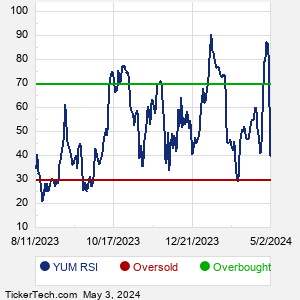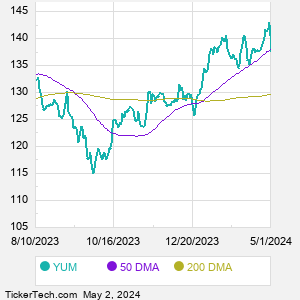Yum! Brands franchises or operates a system of restaurants in various countries and territories under the concepts of KFC, Taco Bell, Pizza Hut and The Habit Burger Grill (collectively, the Concepts). Through its Concepts, Co. develops, operates or franchises a system of both conventional and non-conventional restaurants. Co.'s conventional restaurants feature dine-in, carryout and, in some instances, drive-thru service. Non-conventional units include express units which have a more limited menu and operate in non-conventional locations like malls, airports and subways. Co.'s segments are: the KFC Division; the Taco Bell Division; the Pizza Hut Division; and The Habit Burger Grill Division.
When researching a stock like Yum! Brands, many investors are the most familiar with Fundamental Analysis — looking at a company's balance sheet, earnings, revenues, and what's happening in that company's underlying business. Investors who use Fundamental Analysis to identify good stocks to buy or sell can also benefit from YUM Technical Analysis to help find a good entry or exit point. Technical Analysis is blind to the fundamentals and looks only at the trading data for YUM stock — the real life supply and demand for the stock over time — and examines that data in different ways. One of these ways is called the Relative Strength Index, or RSI. This popular indicator, originally developed in the 1970's by J. Welles Wilder, looks at a 14-day moving average of a stock's gains on its up days, versus its losses on its down days. The resulting YUM RSI is a value that measures momentum, oscillating between "oversold" and "overbought" on a scale of zero to 100. A reading below 30 is viewed to be oversold, which a bullish investor could look to as a sign that the selling is in the process of exhausting itself, and look for entry point opportunities. A reading above 70 is viewed to be overbought, which could indicate that a rally in progress is starting to get crowded with buyers. If the rally has been a long one, that could be a sign that a pullback is overdue. |



